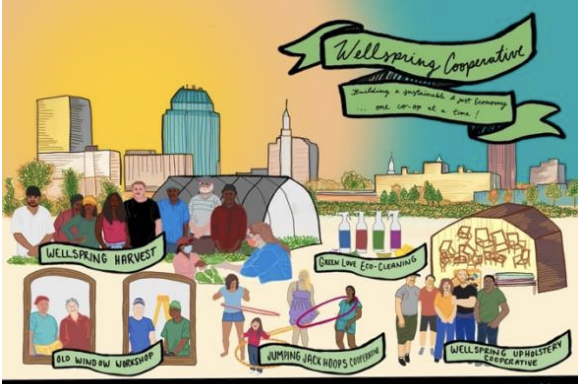Becoming Human: Recent Developments Among Worker Coops In Massachusetts Signal Growth Of Movement

Photo: Wellspring Cooperative
The worker cooperative movement in Massachusetts is making significant gains on two overlapping fronts. First, it is gaining visibility and legitimacy in the public sphere. More and more policy makers, community members, and the general public are seeing the multiple benefits and advantages of worker-owned cooperatives, especially when compared with conventional businesses. Second, the movement is expanding relationships and developing its own theories of political change; it’s building power through a still in-process political orientation that has the potential to be a part of a transformational politics. A couple of recent happenings in the worker-cooperative world can help illustrate these dynamics and (productive?) tension.
The statewide Coalition for Worker Ownership and Power (COWOP) is in the midst of a powerful campaign, Rise to Own It!. As part of Rise to Own It!, COWOP organized two statewide convenings last fall that gathered together worker-owners, organizers, and co-op developers from across the state to learn from each other, forge alliances, and guide COWOP’s policy platform. In between these two meetings, participants had intentional 1:1 meetings to deepen learnings and simply get to know each other on a personal and political level. This latter point is super significant. One of the most remarked upon features of Rise to Own It! by worker-cooperators themselves, was the importance of being together, making decisions together, and beginning to build trust and solidarity as part of a statewide project. Regional alliances of worker-cooperative projects—like the trailblazing Valley Alliance for Worker Cooperatives (VAWC) in the Pioneer Valley, and municipal level projects like the Wellspring Cooperative based in Springfield—turn to the 6th Cooperative Principle, Cooperation Among Cooperatives, to help sustain and support their work. A statewide coalition involving grassroots organizations, labor, developers, organizers, and worker-cooperators, however, is a novel approach in Massachusetts.
Related to COWOP’s policy work, is the recent announcement of the codification of the Massachusetts Center for Employee Ownership (MassCEO). Operated by the ICA Group since 2017, MassCEO will now become a permanent formal office, with expanded community governance and input, and ability to do work in a more cohesive fashion. In January the COWOP coalition elected Karen Ribeiro, currently with Inner Fortune, formerly PV Squared Worker Co-op, to sit on the coalition’s advisory board seat; Said El Abassi of Earthshapers Worker Co-op is alternate in this role. Through this formalization, MassCEO should be even better positioned to help educate policy makers and the public, attract and steer resources, and generally create enabling conditions for the development of worker-cooperatives which must contend with a policy terrain that favors conventional, capitalist businesses.
For those interested in transformational economic and cultural change, this is exciting stuff! Yes, worker-owned cooperatives offer a more inclusive form of business, can stabilize local economies, lessen inequalities, build community wealth, are more disposed to social justice and ecological issues, and are—in at least some cases—more economically successful than conventional businesses (look here for an overview).
This is all much needed.
In worker-owned cooperatives, workers decide for themselves their own working conditions; they collectively negotiate the needs of workers, business, and community; and they collectively appropriate and control surplus.
But the radical and transformative dimension of worker-owned cooperatives is that they embody and enact a non-capitalist set of practices and values, practices and values that can have cascading political and cultural effects. In worker-owned cooperatives, workers decide for themselves their own working conditions; they collectively negotiate the needs of workers, business, and community; and they collectively appropriate and control surplus. Engaging in these practices can reshape how people understand what work is and can be, and can seed desires for other ways of being in the world.
Bringing forward and fully realizing these cooperative desires—to share power, wealth, decision making, rather than individually compete; to make ethical decisions about the present and future, rather than market-based decisions; to be free to reinvent what work and economy means—requires attunement and care. It requires an ongoing analysis and negotiation of dominant interests and ideas that would seek to tame this radical edge and bring worker-cooperatives in-line with the interests of capital. It requires articulating worker-owned cooperatives as, not simply and end in and of themselves, but as part of broader projects that are committed to organizing through post-capitalist, and decolonial politics.
This is the challenge, then, for the cooperative movement—making itself visible and viable to garner the support it needs to flourish, without succumbing to hegemonic interests and ideas that work through the state. A sticky wicket. But a situation that becomes more tenable the more that the movement works towards assembling itself as both counterweight to business as usual, and world-making movement.
Each edition of Becoming Human will feature an article, reflection, interview, poetry, or other types of expression that engage with a creative community or municipal effort. These will include original features that discuss a local initiative and also stories about efforts in other parts of the world that we might learn from. The growing narratives, relations, and power from which other worlds are being assembled, maybe, can help reorient our hope and desire—and resignation—away from the death drive of white supremacist, heteronormative, capitalist modernity, and towards an open, uncharted horizon of radical egalitarianism and towards the reality that other worlds are in the making or already here. For the full introduction to Becoming Human that appeared in its inaugural column, look here. For a listing a previous columns, look here.
Acknowledgements: This column is in dialogue and solidarity with numerous collaborators and comrades including Vin Lyon-Callo, Meredith Degyansky, Penn Loh, Stephen Healy, students in Anthropology 340 – Other Economies are Possible, Anthropology 341 Building Solidarity Economies, Anthropology 597CC Community, Commons, Communism, and the pluriverse of world-making and world-defending efforts, movements, and projects in Massachusetts and around the worlds.
